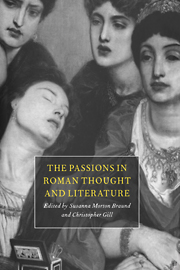Book contents
- Frontmatter
- Contents
- Preface
- Conventions
- Introduction
- 1 Epicurean anger
- 2 Cicero and the expression of grief
- 3 The subjugation of grief in Seneca's Epistles
- 4 A passion unconsoled? Grief and anger in Juvenal Satire 13
- 5 Passion, reason and knowledge in Seneca's tragedies
- 6 Imagination and the arousal of the emotions in Greco-Roman rhetoric
- 7 Pity, fear and the historical audience: Tacitus on the fall of Vitellius
- 8 All in the mind: sickness in Catullus 76
- 9 Ferox uirtus: anger in Virgil's Aeneid
- 10 ‘Envy and fear the begetter of hate’: Statius' Thebaid and the genesis of hatred
- 11 Passion as madness in Roman poetry
- Bibliography
- Index of ancient passages
- General index
9 - Ferox uirtus: anger in Virgil's Aeneid
Published online by Cambridge University Press: 18 December 2009
- Frontmatter
- Contents
- Preface
- Conventions
- Introduction
- 1 Epicurean anger
- 2 Cicero and the expression of grief
- 3 The subjugation of grief in Seneca's Epistles
- 4 A passion unconsoled? Grief and anger in Juvenal Satire 13
- 5 Passion, reason and knowledge in Seneca's tragedies
- 6 Imagination and the arousal of the emotions in Greco-Roman rhetoric
- 7 Pity, fear and the historical audience: Tacitus on the fall of Vitellius
- 8 All in the mind: sickness in Catullus 76
- 9 Ferox uirtus: anger in Virgil's Aeneid
- 10 ‘Envy and fear the begetter of hate’: Statius' Thebaid and the genesis of hatred
- 11 Passion as madness in Roman poetry
- Bibliography
- Index of ancient passages
- General index
Summary
Achilles' slaying of Hector and Odysseus' massacre of the suitors link the themes of anger at the close of the Homeric poems with Aeneas' response to Turnus in the last lines of the Aeneid. Karl Galinsky has studied this in detail, but he also introduced briefly the Greek philosophical tradition, as well as Roman legal practice, to justify Aeneas' enraged killing of Turnus as wholly appropriate in these contexts. Michael Putnam has taken issue with this stand, claiming that, on the contrary, Aeneas' final action is reprehensible, to be condemned in Stoic terms as incompatible with wisdom, revealing lack of moderation, moral blindness and ultimate failure as either heroic or Roman exemplum.
My purpose is not to attempt to solve the problems inherent in the last lines of the Aeneid, but to mediate on the controversy of principle that underlines the particular disagreement between these two points of view. This involves reopening and broadening the discussion by suggesting the use of a variety of passages from the poem as a whole to show that Virgil is interested in the psychology and physiology of anger primarily in their contribution to the development of epic character and action. In this the Homeric precedents are of crucial importance, but they have been filtered through the general understanding of human passion and motivation developed by Plato and especially by Aristotle; these philosophically based conclusions are still of relevance and interest to contemporary psychological theory. The Stoics, however, in their condemnation of all passion as intellectual error, mental illness and moral collapse, deliberately restricted the evidence of empirical observation in the interests of ethical consistency, and did so in a manner that set their theory at variance with poetic insight and representation.
- Type
- Chapter
- Information
- The Passions in Roman Thought and Literature , pp. 169 - 184Publisher: Cambridge University PressPrint publication year: 1997
- 13
- Cited by



